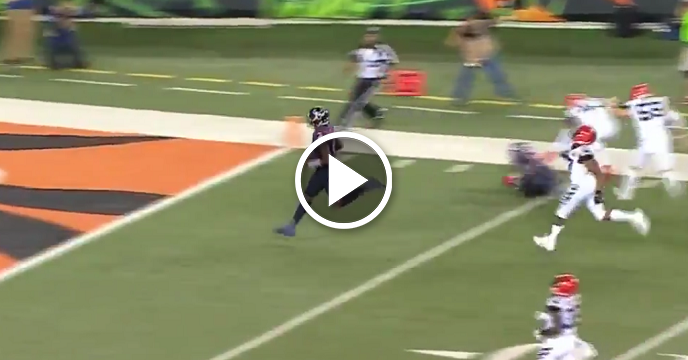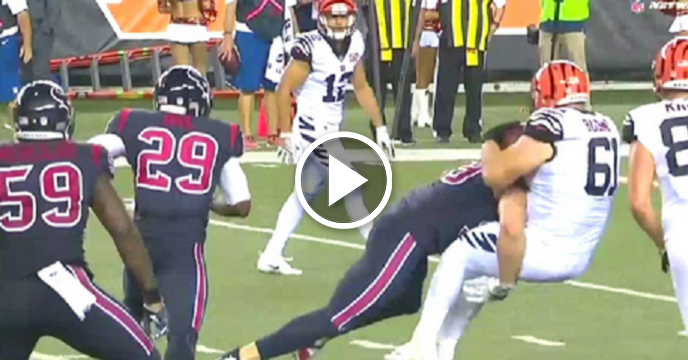“How well the Miami Heat plays will be dependent upon how well Miami plays as a team,” I said yesterday on KXPS Team1010.
I could not have been more wrong.
The Miami Heat dump-trucked the Boston Celtics last night, 98-79 (in a game that was never even that close), due in no small part to the best player in the world, LeBron James, playing like … LeBron James.
His 45-point, 15-rebound, 5-assist playoff statline has only been matched by a man named Wilt back in the grainy footage days of 1964.
We’ve seen LeBron take over games before: That 2007 game against the Pistons were he dropped 25 in the final quarter. That 2009 series against the Magic where he averaged 38.5 points per contest.
But, on one night, start-to-finish, we’d never seen this LeBron. Make no mistake, we’ve conceptualized this LeBron. We’ve been calling him “The Best Player On Earth” for a half-decade now. But we’ve never seen him fully realize the depth and breadth of his talents at this sustained level on a one night stand.
Why? Why was LeBron James so good last night on a level we’d never seen before? Why did he put it all together last night?
We’ve already been battered by the usual soundbites:
“He had that look in his eye before the game began.”
“He never cracked a smile on the court the entire game.”
“He was locked in.”
But … why? And are we supposed to believe you can’t excel at your job with a smile on your face? We must dig deeper!
LeBron made 12 of his first 13 shots and scored 30 in the first half. Here’s his shot chart:

LeBron shot 10-10 from the paint or the top of the key, with a head-spinning mix of tip-ins, dunks and pull-up jumpers. For the game, he shot 73% from the field. His career playoff average is 47%.
So was this lightning in a bottle?
Well … yes. I ask you this: What if a series of conditions made it psychologically impossible for LeBron to be anything but this great?
There’s a concept in Psychology called “Flow.” Proposed by Mihály Csíkszentmihályi (yup, we name-check Hungarian Psychology professors here), “Flow” is the mental state of operation in which a person is fully immersed, energized and focused in the success of their current activity. There are a million synonyms for this concept, but the one most often used in sports is “In The Zone.”
“Flow” requires a set of conditions that can be reduced to high level of skill meeting high level of challenge, as illustrated in the accompanying graph.

More specifically, “Flow” identifies 9 possible accompanying factors that correlate to being “In The Zone.”
1. Clear, challenging goals that align with a given individual’s skill-set.
2. A high degree of concentration allowing a person to have the opportunity to immerse themselves in the activity in which they’re engaged.
3. A fading of self-consciousness, where action and awareness merge into action alone.
4. A distorted sense of time in the mind of the individual.
5. Direct, immediate feedback on the success or failure of an activity. (i.e. shot goes in, or does not. Team is winning, or losing.)
6. A harmonious, directly proportional relationship between skill level and challenge, where the task at hand is neither too easy nor too difficult.
7. A sense of personal control over the situation or activity.
8. The activity is intrinsically rewarding, with no extra effort needing to be placed to achieve an external reward or approval.
9. A lack of awareness of hunger, fatigue, exhaustion, thirst, illness or danger.
Athletically, these factors manifest themselves in general by (as suggested by runner and cricket coach Roy Palmer) merging conscious and subconscious motor skills and reflexes to create a single, effortless coordination of movement. The ball releases from the hand smoother, more soundly, more correctly, with less effort.
For another example, we turn to Formula One racing and the 1988 Monaco Grand Prix. Ayrton Senna qualified with what was considered by those in the F1 circle a mind-bending lap time of 1:23, a full 1.4 seconds faster than the next closest driver. Senna famously described his transcendent driving experience:
“I was already on pole, […] and I just kept going. Suddenly I was nearly two seconds faster than anybody else, including my team mate with the same car. And suddenly I realized that I was no longer driving the car consciously. I was driving it by a kind of instinct, only I was in a different dimension. It was like I was in a tunnel.”
Senna’s time in the zone continued through the race, as he started on the pole and built a colossal 46-second lead through 48 laps. Senna was obliterating the field in fascinating fashion. The cornering was smooth and the car seemed to rocket out of the turns like a bolt of lightning.
That moment, a crew member radioed in that his lead was insurmountable and instructed Senna to slow down. After the second-place driver gained a ridiculous 6 seconds on Senna on Lap 65, the leader panicked, speeding back up and setting two fastest laps before crashing just 10 laps from certain victory.
Because outside forces began to dictate strategy, and because action and awareness had uncoupled from each other, Senna was released from the “Flow” the moment he agreed to follow his crew’s instructions to slow down. He was now placing conscious effort into what was up until that point a harmonious, concentrated, fully immersed activity. Had a crew member not radioed in, and just allowed Senna to drive naturally, perhaps we’d look at Senna’s Monaco Grand Prix run the way we look at Secretariat at the 1973 Belmont.
So how does “Flow” apply to LeBron’s magical night?
The goal for James was clear: To lead his Heat to a Game 6 victory.
Direct, immediate feedback was present. Each shot has a binary outcome, each defensive possession has the same and the scoreboard is the sole indicator of success or failure.
LeBron is the most talented player in the NBA, so it’s reasonable to suggest that no moment in an NBA game would put him in “over his head” from a skill standpoint.
That takes care of factors #1, #5 and #6 right off the bat. The juiciest bits from last night come when we examine the others.
It was stated by countless sources yesterday that LeBron was solely concentrated on the task at hand pre-game, and how he showed no emotion during his dismantling of the Celtics. He shouldered the burden of the responsibility of winning, talking to reporters about how it was all on him. How excited he was to get out there for Game 6. The mental seeds were planted for Total LeBromination.
But a knock on LeBron has always been he seemed too consumed by what people thought of him, too self-aware, too self-conscious. It may correlate with his hesitant behavior in crunch time or his frequently awkward unsolicited soundbites. (See last year’s “It would be fun to play in front of these fans again” quote for reference.) Last night, he somehow shed the hell of high expectations and was able to just ball. With the muscle memory accumulated from each made shot and every successful defensive stop, awareness of his actions, and how people reacted to them, (note this classic line from last night’s presser, when asked about his opponents: “I wasn’t really paying attention to what they were doing.”) faded, leaving just a man and his craft.
No ‘playing for anyone else’, or ‘silencing the doubters’ or ‘I gotta get paid.’ This was just a kid and his ball on his court, losing track of everything but the moment. Everything but the distance between himself and the basket; between his team and victory.
And when it was all done and LeBron finally fielded questions at the podium, reporters remarked how “exhausted” he seemed. “I’ve never seen LeBron play that great,” tweeted J.A. Adande. “And I’ve never heard him sound this tired.”
LeBron completely ignored his body’s needs. He had sucked himself dry in a seductive sunburst of unfiltered, unconscious basketball glory.
And with that, we can unquestionably say LeBron experienced “The Zone” last night – that rarefied space that can’t be found on a map, can’t be driven to by effort or direction alone, and can’t be willed into.
But every so often, a player finds his way there, and when it’s a superlative player in the biggest of moments, it’s electric for those of us who’ve been lucky to witness it. Last night, LeBron meandered to that special plane of achievement, a place like a cross between Jordan’s “Flu Game” and Otis Redding at the Monterrey Pop Festival. One man: Unable to miss, uncoupled from time and space, and completely unaware that the magic fueling his transcendence was the only fuel remaining in a tank that was last night a reservoir for miracles.
 Share
Share 




